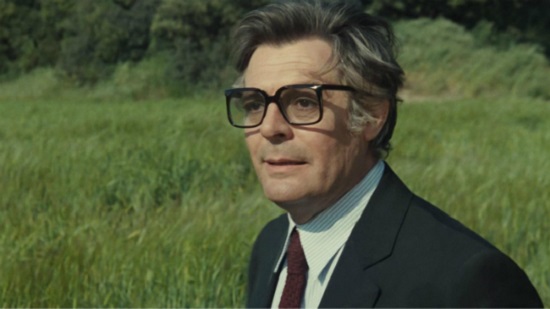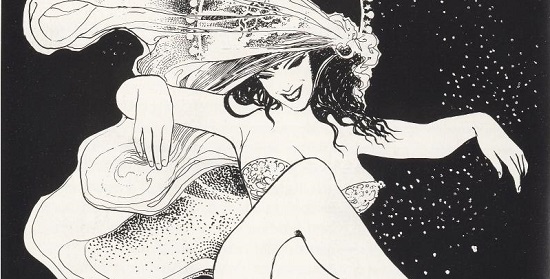While the films of Federico Fellini were always personal, they were never exactly private. 1980’s La Citta Delle Donna (City of Women as we’ll call it from now on) changes this: Fellini delves into the dark and obscure recesses of his psyche in search of his true self and turns up tumescent amid a carnivalesque cast of female beauties, hags, housewives, rampantly militant lesbians and a miniscule birdlike celebrity named Mrs. Small who has found inner sanctum through marriage to six docile husbands. Never let it be said that Federico Fellini was a crusading feminist, a beacon of hope for mis-represented females across the world. He wasn’t. City of Women does nothing to alter this assessment.
Fellini hoped this his modern-day depiction of an inept Casanova named Snàporaz (Marcello Mastroianni semi-reprising his character from 8½) and his fumbling encounters with various cartoonish women would create a comic portrait of the problematic relationship between men and women in his cinema. But if you come to the film in search of a profound exploration of Freudian tropes and feminist ideology then look elsewhere. Fellini executes his message with all the grace and charm of a severe industrial accident.
The lavish and lascivious City of Women screams priapism from the off (or, at least, a terminally unfulfilled priapism). We encounter our hero waking from a snooze on a train as his gaze is met by the shifting presence of a beautiful woman [Bernice Steger] purring seductively across the carriage. As she alights towards the bathroom, Snàporaz, naturally, follows and his fumbling attempts at ensnarement are rebuffed by the woman’s imperious attitude as she challenges him to prove his virility before pulling the emergency lever and disappearing off into a nearby field, with Snàporaz belatedly on her trail.
Snàporaz is lured into a forest which leads to a feminist convention. It’s feminism as a bazaar: lectures abound on the wonders of the vagina and the repugnance of “phallic narcissism”, elsewhere placards proclaim “penetration is a crime!”. Snàporaz is ignored, bullied, toyed with, threatened, frightened, flirted with and eventually taken hostage by a muscular, motor bike riding farm woman who agrees to drive him back to the station but, instead, attempts to rape him in a lonely pea patch. Poor Snàporaz’s virtue is saved by the appearance of the would-be rapist’s mother, a country crone who is as ignorant of feminism as she is ancient. Humbly, she apologises for her daughter’s bad manners.

The menagerie of twisted archetypes is initially rapturous but the lustre soon fades. The assorted women seem less like sirens than like judges at a trial and outlandishly embody Snàporaz (and Fellini)’s fear of the feminine. Fellini is troubled deeply by the bondage of women, both from his past and within his own films, which makes this an increasingly terrifying yet wearying attempt to imagine what such a condition might be like. The constant thwarting of Snàporaz’s oneiric desires leads to grim inevitabilities repeating themselves and Snàporaz increasingly regresses towards his childhood: a happier and more secure time than the present and one in which the likelihood of being accosted by females intent on castration is hopefully diminished.
Minor relief arrives in the form of big cock, both in the literal and nomenclatural sense. If Snàporaz is redolent of the vulnerable and neurotic aspect of the male psyche, his counterpart Dr. Katzone (aka Big Cock) is the horny devil on the flipside. Katzone lives in an art deco mansion and is on the verge of celebrating his ten thousandth conquest. In his home, there is a passageway replete with a photograph of every one of his lovers – complete with recordings of their moans of passion.
But it simply goes on too long, far too long. Fellini makes his point, hammers it home and rams it down our gullet for over two hours. City of Women straddles the line between vampish and vulgar and ends up closer to vacuous in the process. The director has constructed a dispiriting parade of angry women engaging in relentless tirades and repeatedly makes reference to his previous films in a case of reculer pour mieux sauter: the film appears to be Fellini’s attempt to proof himself against any allegations of anti-feminism by others, an anticipatory strike pre-empting future attacks. Yet the repetition is close to self-plagiarism: the excesses of La Dolce Vita are dragged out to infinity, the fairytale erotica of Satyricon is saturated in ill-fitting agitprop and the reflexivity of Amarcord drowned in solipsism.
Made on the cusp of the 1980s, the film has not aged well and has little in the way of kitsch sheen. We do encounter some punky looking teens and Italo-disco courtesy of Gino Soccio but the director is forever peripheral, forever voyeuristic and fetishizing contemporary trends. And while the opening scene of Snàporaz’s coitus interruptus is an amusing springboard for the camp jamboree which follows, the entire process comes off as rather cold and remote. Perhaps it’s the shrill embodiments of femininity which populate the film – the harridans, the fishwives, the evil adolescents – or perhaps it’s the fact that not a single human being numbers among them.
La Citta Delle Donne is available now on DVD and Blu-ray from Eureka Entertainment.


